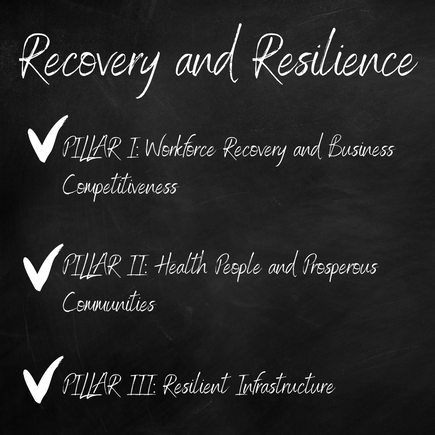 Ontario is responsible for almost 40% of our national Gross Domestic Product (GDP) and is home to roughly 40% of Canada’s small businesses. The Ontario Chamber of Commerce (OCC) and Ontario Chamber Network are calling on all political parties to take bold action to strengthen business competitiveness as the economy continues to reopen and recover. Its Ontario Business Matters federal election platform underscores longstanding issues that need to be addressed for our long-term resilience and recovery. The three-pillar platform includes: PILLAR I: Workforce Recovery and Business Competitiveness 1. Eliminate barriers to interprovincial labour mobility and trade. Economic activity in Canada is hampered by inconsistent rules around transportation, the environment, securities, professional certification, agri-food marketing, food safety, and more. To ensure businesses can make the most of internal markets, Canada should work with provinces to accelerate harmonization efforts. 2. Enhance small businesses’ access to capital. In the short-term, a replacement program for the Canada Emergency Wage Subsidy (CEWS) would ensure businesses that were hardest hit by the pandemic are able to operate sufficiently. Further, government should consider debt relief measures, such as forgiving interest payments on COVID-related government loans, for small businesses that continue to feel the repercussions of the crisis. 3. Expand immigration to support labour market needs. Ontario’s allocation of immigrants under the Ontario Immigrant Nominee Program should be increased to reflect our growing labour market needs and supply gaps that have been amplified by the pandemic. 4. Reform the federal tax system. A comprehensive review of Canada’s tax system, rooted in the principles of competitiveness, simplicity, fairness, and neutrality, is long overdue. Reforms should focus on streamlining the system and incentivizing increased business investments. 5. Increase support for the digital transformation. Introduce permanent funding streams to help businesses pivot online, reach customers, and tap into digital marketspaces. 6. Prioritize national privacy modernization. Re-introducing Bill C-112 in the next parliament will set a single standard for privacy protection, preventing a costly and confusing patchwork of rules across provinces. 7. Develop forward-looking natural resource strategies. Ontario’s mining and forestry sectors are well positioned to provide Canada and its trading partners with a reliable source of primary resources required for electric vehicles, computer chip manufacturing, buildings, and more. Cohesive strategies and targeted investments in Northern Ontario will be necessary to meet the growing demand for these products. PILLAR II: Health, People and Prosperous Communities 1. Advance reconciliation with Indigenous peoples of Canada. Since the Truth and Reconciliation Commission of Canada issued its 94 calls to action in 2015, only a handful of those recommendations have been implemented. The next Parliament – along with businesses – must do better to confront Canada’s racist legacy and the enduring implications of the residential “school” system. 2. Increase health transfer payments to Ontario. Pandemic measures have resulted in limited cancer screening and a surgical backlog. The increased pressures on Ontario’s health care workers and infrastructure highlight the need for funding to address growing healthcare needs, support the province’s aging population, and prepare for future crises. 3. Work with Ontario to improve accessibility and affordability of childcare. Women and minority groups have been disproportionately affected by the pandemic with many continuing to stay at home to care for young children. To ensure a strong post-pandemic recovery, the federal government must work with Ontario to reach an agreement as soon as possible to reduce childcare costs and improve access for families. 4. Advance opportunities for women and equity seeking groups in economic recovery. Enhance reskilling and education programs for those displaced by technology adoption and pandemic-related job losses. 5. Develop a national life sciences strategy. A life sciences strategy that builds on Ontario’s competitive advantages in biomanufacturing and therapeutics will ensure Canada is prepared for any future health crisis, while facilitating new jobs, investment, and innovation. PILLAR III: Resilient Infrastructure 1. Accelerate investments in digital infrastructure. As more services and workplaces become digital, digital infrastructure must be expanded and enhanced to ensure people and businesses across Ontario can access the future of jobs, education, and health care. Broadband investments should be coordinated with the private sector to avoid duplication and maximize the impact of public programs. Further, the internet of things and smart city technologies should be developed to increase living standards, maximize cost-efficiencies, and reduce carbon emissions. 2. Electrify and expand public transit. Support provinces and municipalities with the expansion of transit systems and the shift to electric fleets. 3. Partner with industry to confront climate change. The federal government can advance both decarbonization and economic recovery by partnering with industry to de-risk sustainable innovation. Ontario’s competitive advantages include cleantech, nuclear energy, electric vehicles, renewable natural gas, and biomass. Comments are closed.
|
AuthorThe Peterborough and the Kawarthas Chamber of Commerce acts as a catalyst to enhance business growth, opportunity, innovation, partnerships and a diverse business community. Archives
June 2024
Categories |
|
Copyright Greater Peterborough Chamber of Commerce. All rights reserved.
175 George Street North, Peterborough, ON, K9J 3G6 Phone: (705) 748-9771 | (705) 743-2331 Home | Calendar | Site Map | Privacy | Accessibility |
